This lesson explains what "to be saved" means in the Old Testament of the Bible. In the Old Testament "to be saved" means to be delivered by God into safety.
This lesson uses scripture quotations from the English Standard Version (ESV) and the New American Standard Bible (NASB) (Ref. 1) unless noted otherwise.
Consider. What do the words, "to be saved," mean to you in the religious sense?
1. "To be saved" in the Old Testament means "to be delivered"
The Old Testament Hebrew word for saved is yasha, pronounced (yaw-shah'). Yasha means to deliver (Ref. 2). To be saved means to be delivered with the implication of being delivered by God into safety. Strong's Exhaustive Concordance translates yasha as help, preserve, rescue, be safe, and savior (saviour) (Ref. 2). Brown-Driver-Briggs adds the meanings of to make wide, spacious, and liberate (Ref. 2).
Items "a" through "d" below provide examples from the Old Testament for what it means to be saved. a. Delivered by God from all enemies
Psalm 18:3 -- "I call upon the Lord, who is worthy to be praised, and I am saved from my enemies." David wrote this psalm of deliverance early in his reign when God had recently delivered him from the Philistines as well as from Saul (2 Samuel 21:15-2 Samuel 22:4). In Hebrew, the tenses of David's calling upon the Lord and being saved are frequentive (present), describing "David’s habitual experience of God’s readiness to answer prayer" (Ref. 3).
b. Delivered by God from all foes - physical and spiritual(1). Calamities and distresses
1 Samuel 10:19 -- The prophet Samuel said to the Israelite people, "But today you have rejected your God, who saves you from all your calamities and your distresses, and you have said to him, ‘Set a king over us.’ Now therefore present yourselves before the Lord by your tribes and by your thousands."
(2). Troubles
Psalm 34:6 -- David writes, "This poor man cried, and the Lord heard him and saved him out of all his troubles." Note that this verse does not say that as God's people we will have no troubles. This verse says that God hears us and delivers us out of our troubles.
(3). Adversaries
Exodus 14:29-30 -- "But the people of Israel walked on dry ground through the sea, the waters being a wall to them on their right hand and on their left. 30 Thus the Lord saved Israel that day from the hand of the Egyptians, and Israel saw the Egyptians dead on the seashore." God saved the Israelites that day to make his power known -- to them, to succeeding generations, and to us. See Psalm 106:7-12.
2 Chronicles 32:22 -- "So the Lord saved Hezekiah and the inhabitants of Jerusalem from the hand of Sennacherib king of Assyria and from the hand of all his enemies, and he provided for them on every side." (4). Wounds and sicknesses
Jeremiah 17:14 -- The prophet Jeremiah writes, "Heal me, O Lord, and I shall be healed; save me, and I shall be saved, for you are my praise."
The Lord saved (delivered) Hezekiah in two respects - first, from his enemy, Sennacherib (2 Chronicles 32:22), and second, in regard to his health (Isaiah 38:19-20). For background on Hezekiah's illness, prayer, and healing, read Isaiah 38:1-8. (5). Wild animals
Psalm 22:21 -- David writes, "Save me from the mouth of the lion! You have rescued me from the horns of the wild oxen!"
(6). Sin, Idols, and Moral Troubles
Ezekiel 37:23 -- "They shall not defile themselves anymore with their idols and their detestable things, or with any of their transgressions. But I will save them from all the backslidings in which they have sinned, and will cleanse them; and they shall be my people, and I will be their God." The context of this verse is the reunion of Judah and Israel into one kingdom, one nation. See Ezekiel 37:15-22.
2. God invites people to be saved (Old Testament)a. God is our Savior (Saviour). There is no other.
Isaiah 45:21 -- "And there is no other God besides Me, A righteous God and a Savior; There is none except Me."
Compare Isaiah 45:21 with Acts 4:10, 12. b. God invites all the world to turn to him and be saved.
Isaiah 45:22 -- "Turn to me and be saved, all the ends of the earth!"
Becoming saved in the religious sense requires turning away from our false gods and sins and turning towards (by implication, facing) God (Ref. 4). "The direction to look to God for salvation implies a deep conviction of helplessness and of sin; and a deep conviction that he only can save" (Ref. 5). God extends the invitation of salvation to all the world. Compare Isaiah 45:22 with John 3:16. c. God desires to save people despite their (our) sin and rebellion.
Psalm 106:6-8 -- "We have sinned like our fathers, We have gone astray, we have behaved wickedly. 7 Our fathers in Egypt did not understand Your wonders; They did not remember Your abundant kindnesses, But rebelled by the sea, at the Red Sea. 8 Nevertheless He saved them for the sake of His name, So that He might make His power known."
Compare Psalm 106:6-8 with Romans 5:8-9. d. Our response as God's people to being saved is to rejoice and to praise God.
Isaiah 25:9 KJV (italics added) -- "And it shall be said in that day, Lo, this is our God; we have waited for him, and he will save us: this is the Lord; we have waited for him, we will be glad and rejoice in his salvation."
Isaiah 38:20 NIV -- "The Lord will save me, and we will sing with stringed instruments all the days of our lives in the temple of the Lord." Psalm 95:1 -- "Oh come, let us sing to the Lord; let us make a joyful noise to the rock of our salvation!
Apply. Turn to God, and he will save you from your idols and sins. Pray to God, and he will deliver you out of your troubles as he has promised (Psalm 34:6). Rejoice in God your Savior, and praise him for his salvation.
Related Lessons
"God's Offer of Salvation and Eternal Life" (John 3:16) "What Does 'To Be Saved' Mean in the New Testament?" (Acts 16:31)
1 Comment
"Ho! Everyone who thirsts, Come to the waters; And you who have no money, Come, buy and eat. Yes, come, buy wine and milk Without money and without price." (Isaiah 55:1)
This lesson explains God’s great invitation in Isaiah 55:1, "Everyone who thirsts, come to the waters," and "Come, buy wine and milk without money and without price."
This lesson is the second in a series on God's Invitations in the Bible, specifically, the "Comes" of God's word. The first lesson in the series was "Come Now, Let Us Reason Together (Isaiah 1:18)" (Ref. 1).
Consider. Are you are spiritually thirsty or hungry? Come to God and find true refreshment and nourishment for your soul.
Everyone Who Thirsts
God invites thirsty people to come to him. When you are thirsty, you know that you have an intense desire to satisfy your thirst (for example, with a drink of water). When you are a sinner you may already sense your need for salvation (Matthew 5:6, Ref. 2). God, and only God, is the one who can satisfy your thirst.
The Psalmist recognized the thirsting of his soul when he wrote, "As a deer pants for flowing streams, so pants my soul for you, O God. My soul thirsts for God, for the living God" (Psalm 42:1-2). Come to the Waters
God himself is the source of the spiritual water that truly refreshes and revives. The Lord said, "For I will pour water on the thirsty land, and streams on the dry ground; I will pour my Spirit upon your offspring, and my blessing on your descendants" (Isaiah 44:3). Likewise, when Jesus, the Son of God, encountered the Samaritan woman at the well, he said to her, "Whoever drinks of the water that I shall give him will never thirst. But the water that I shall give him will become in him a fountain of water springing up into everlasting life" (John 4:13-14).
God invites you to come to him to satisfy your spiritual thirst (John 7:37). Come, Buy, and Eat
God provides food that truly satisfies, and it is free. God alludes to the food that satisfies in Isaiah 55:2, "Why do you spend your money for that which is not bread, and your labor for that which does not satisfy?
The real blessing, the real food which truly satisfies people's wants and desires is Jesus himself. Jesus said, "I am the bread of life; whoever comes to me shall not hunger, and whoever believes in me shall never thirst" (John 6:35, Ref. 3). Come, Buy Wine and Milk without Money and without Price
In Isaiah 55:1, wine and milk are figurative for God's choicest blessings (Ref. 4). Wine is a gift of God (Genesis 27:28). Melchizedek, priest of God Most High, brought wine and bread together to Abraham (Genesis 14:18). The Psalmist wrote that wine gladdens the heart of man (Psalm 104:14-15). Milk provides nourishment needed for sustenance and growth (Proverbs 27:27, 1 Peter 2:2).
God offers spiritual blessing without money and without price. No silver or gold can buy the blessing which God offers (Ref. 5). Jesus Christ himself is the gift that God freely offers (John 3:16). Jesus himself is the all-sufficient supply for every thirst of your soul (John 7:37, Ref. 6).
Apply. Accept God's invitation. Come to God and find true satisfaction for the hunger and thirst of your soul. Put your faith and trust in God's Son, Jesus, who promises, "I am the bread of life; whoever comes to me shall not hunger, and whoever believes in me shall never thirst" (John 6:35).
Related Lessons
"Jesus' Invitation - Come to Me and Rest" (Matthew 11:28-30) "Come Now, Let Us Reason Together (Isaiah 1:18)" "Jesus is the Bread of Life" (John 6:35)
References
1. http://www.scriptureway.com/home/come-now-let-us-reason-together-isaiah-118 2. https://biblehub.com/commentaries/barnes/isaiah/55.htm 3. http://www.ScriptureWay.com/home/jesus-is-the-bread-of-life 4. https://biblehub.com/hebrew/2461.htm 5. https://biblehub.com/commentaries/ellicott/isaiah/55.htm 6. https://biblehub.com/commentaries/maclaren/isaiah/55.htm
"Come now, let us reason together, says the Lord: though your sins are like scarlet, they shall be as white as snow; though they are red like crimson, they shall become like wool." (Isaiah 1:18)
This lesson is the first in a series on the "Comes" of God's word. This lesson describes God's invitation in Isaiah 1:18, "Come now, let us reason together, says the Lord: though your sins are like scarlet, they shall be as white as snow."
Consider. In Isaiah 1:18-20 (Old Testament), God's forgiveness was conditional on the people's obedience to God. How do people today receive God's forgiveness now that Christ has paid the penalty for sin?
Introduction
Being accused of having hands full of blood was a serious accusation. Yet, that is exactly how the Lord accused the people of Judah and Jerusalem (Isaiah 1:1) in Isaiah 1:15, "Even though you make many prayers, I will not listen; your hands are full of blood." Having hands full of blood is a symbol for the cruel wrongs the people had committed including the guilt of actual murder (Isaiah 1:21, Ref. 1). Isaiah had already spoken against the people for their rebellion against God (Isaiah 1:2) and for the insincerity of their sacrifices, offerings, festivals, and prayers (Isaiah 1:11-15).
Come Now
In Isaiah 1:18, God says "Come now." The Hebrew word for come is halak, which means to go, come, walk (Ref. 2). Here in Isaiah 1:18 "Come" is a summons for the recipient of the message to approach the speaker (God). Although God does not force the people of Judah and Jerusalem to come to him, God strongly urges the people to come to him that they might receive his pardon. Likewise, today God strongly urges all sinners to come to him.
Let Us Reason Together
The Hebrew word for let us reason together, yakach, means to decide, adjudge, prove, and argue (Ref. 3, Job 13:15). The idea is that of a legal process in which each party maintains his own case (Ref. 4, Isaiah 43:26). God proposes to present to the people of Judah and Jerusalem the principles on which he is willing to forgive their sins and bestow his pardon (Ref. 5). God describes the terms for pardon in Isaiah 1:18-20.
Though Your Sins Are Like Scarlet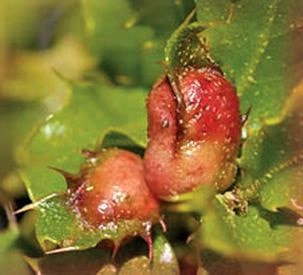 The Crimson or Scarlet Worm (Ref. 7) The Crimson or Scarlet Worm (Ref. 7)
The stain of the people's sins are bright red and indelible like the scarlet dye used by the ancients. The ancients made scarlet and crimson dyes from the dried bodies of the insect (worm), Coccus ilicis found on oak trees in Spain and in the countries east of the Mediterranean (Ref. 5, Ref. 6, Ref. 7).
When it was time for the female Coccus ilicis to give birth, she would attach herself permanently to an oak tree. Her body protected her eggs until the larvae were hatched and able to live on their own. As the mother died, she oozed a crimson fluid which stained her body and the surrounding wood. The death of the female Coccus ilicis paints a picture of the death of Christ who sacrificed his blood on the wood of the cross that others, by believing in him, may live (Ref. 7, Ref. 8).
The scarlet dye was indelible. Cotton material was dipped in this color twice so the stain was permanent (Ref. 5). The stain of the red dye (and likewise the stain of sin in the human heart) could not be washed away by man alone. That is why we as sinners need God's action to wash us clean.
The scarlet dye was known since early in the Old Testament times, centuries before the prophet Isaiah. For further study, I suggest you check these additional references for scarlet in the Bible:
They Will Be White as Snow
Only God can forgive sin. Only God can cleanse people and wash away their sin. David recognized this principle. He prayed to God, "Have mercy on me, O God, according to your steadfast love; according to your abundant mercy blot out my transgressions. Wash me thoroughly from my iniquity, and cleanse me from my sin!" (Psalm 51:1-2). David also wrote, "Wash me, and I shall be whiter than snow" (Psalm 51:7). White symbolizes innocence and purity (Ref. 9). "White as snow " is "a powerful figurative description of the result of forgiveness" (Ref. 10 below).
Though They Are Red Like Crimson, They Shall Be as Wool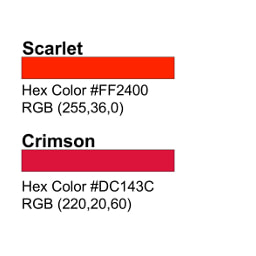 Scarlet and Crimson Colors (Ref. 11) Scarlet and Crimson Colors (Ref. 11)
Scarlet and crimson are similar reddish colors. Scarlet is bright red with an orange tint. Crimson is a strong, bright, deep red color combined with some blue or violet, resulting in a small degree of purple (Ref. 11). Crimson is associated with the stain of blood (Isaiah 1:15, Ref. 12). The ancients employed crimson color to dye wool (Ref. 5).
The Hebrew word for red in the phrase "red like Crimson" is adom, which means glaring, flagrant in Isaiah 1:18 (Brown-Driver-Briggs, Ref. 13). Though their sins are flagrant and appear as deep stains, God, upon their repentance and reformation, will remove their sins so they will be like wool restored to its original, undyed whiteness (Ref. 14). Forgiveness - By Obedience or by Faith?
In the Old Testament, God's relationship with man was based on obedience to God. Isaiah confirms this point in regard to God's forgiveness. In Isaiah 1:18 God offers forgiveness and cleansing to the people of Judah and Jerusalem. However, God's forgiveness and cleansing was conditional based on their willingness to obey God. Isaiah 1:19-20 describes the conditions for God's forgiveness, and the consequences for not obeying God. "If you are willing and obedient, you shall eat the good of the land; but if you refuse and rebel, you shall be eaten by the sword; for the mouth of the Lord has spoken" (Isaiah 1:19-20, italics added). For further study on God's relationship with man in the Old Testament based on obedience, I suggest reading Deuteronomy 30:15-20.
In the New Testament, God's relationship with man is based on faith in Christ. The Apostle Paul writes, "For by grace you have been saved through faith. And this is not your own doing; it is the gift of God" (Ephesians 2:8). Faith in Christ means believing in, trusting in, and having confidence in Christ (Ref. 15). Peter preached to the Gentiles gathered in Cornelius' house that through the name of Jesus everyone who believes in him receives forgiveness of sins (Acts 10:34-43). God's power to cleanse our sins "white as snow" is through the blood of Christ (1 John 1:7). Summary - Main Principles
Let's review the main principles in this lesson:
1. God invites all sinners to come to him that we might receive his pardon (Isaiah 1:18). 2. The stain of sin is red as scarlet (Isaiah 1:18). 3. Only God can wash our sins white as snow (Isaiah 1:18, Psalm 51:7). As a result of Christ's death, we know that it is the blood of Jesus that cleanses us from all sin (1 John 1:7). 4. In the Old Testament, God's forgiveness was conditional on the people's obedience to God (Isaiah 1:18-20). In the New Testament, God provides forgiveness and cleansing through faith in Christ (Ephesians 2:8, Acts 10:43).
Apply. If you do not know Christ, come to him, confess your sin, and ask him to forgive you. Put your faith and trust in him and walk in the cleansed life that Christ has given you. If you do have faith in Christ as your Savior, walk with him in the light. Thank him for forgiving your sin and for cleansing you from all unrighteousness (1 John 1:7-9).
Related Lessons
"God's Great Invitation - Come, Satisfy Your Thirst" (Isaiah 55:1) "Jesus' Invitation - Come to Me and Rest" (Matthew 11:28-30)
References
1. https://biblehub.com/commentaries/cambridge/isaiah/1.htm Cambridge Bible for Schools and Colleges - Isaiah 1:15 2. https://biblehub.com/hebrew/1980.htm 3. https://biblehub.com/hebrew/3198.htm 4. https://biblehub.com/commentaries/cambridge/isaiah/1.htm Cambridge Bible for Schools and Colleges - Isaiah 1:18 5. https://biblehub.com/commentaries/barnes/isaiah/1.htm Barnes' Notes on the Bible - Isaiah 1:18 6. https://www.biblegateway.com/resources/encyclopedia-of-the-bible/Scarlet 7. https://www.discovercreation.org/blog/2011/11/20/the-crimson-or-scarlet-worm/ 8. https://studybible.info/strongs/H8438 9. https://www.biblegateway.com/resources/encyclopedia-of-the-bible/White 10. The NIV Study Bible, Zondervan Bible Publishers, 1985, note on Isaiah 1:18 11. https://en.wikipedia.org/wiki/Shades_of_red 12. https://biblehub.com/commentaries/ellicott/isaiah/1.htm Ellicott's Commentary for English Readers - Isaiah 1:18 13. https://biblehub.com/hebrew/119.htm 14. https://biblehub.com/commentaries/jfb/isaiah/1.htm Jamieson-Fausset-Brown Bible Commentary - Isaiah 1:18 15. https://biblehub.com/greek/4102.htm |
Daily Bible Verse(Click the link above) AuthorMr. Whitney V. Myers. Christian. For more information, please visit the Author Page. Posting ScheduleI plan to provide new postings about once a month. Planned Topics(subject to change) Recent Posts(most recent three months) Popular Posts(top 10) Categories
All
Archives
July 2024
|
|
Copyright 2018-2024 Whitney V. Myers |
Listed in Feedspot's Top 100 Bible Study Blogs and Websites |
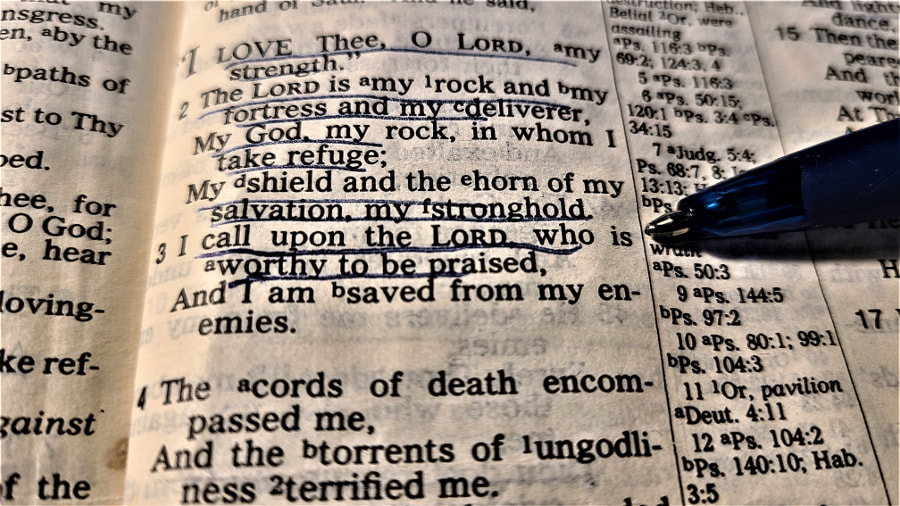
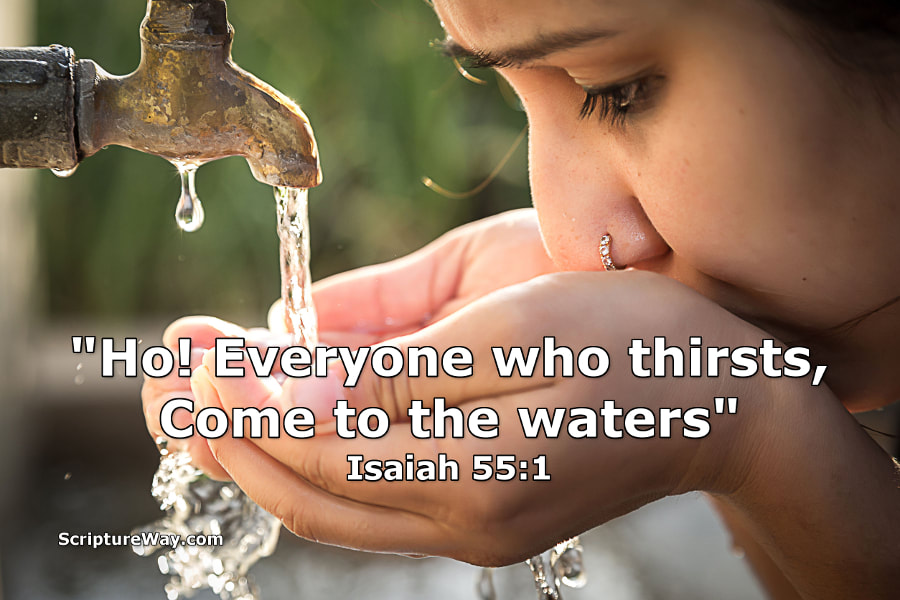
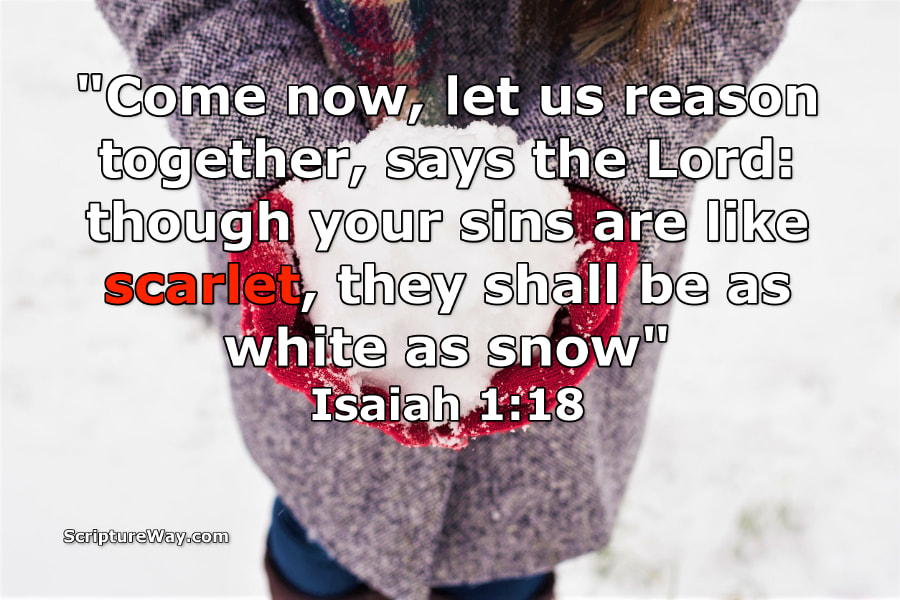
 RSS Feed
RSS Feed
